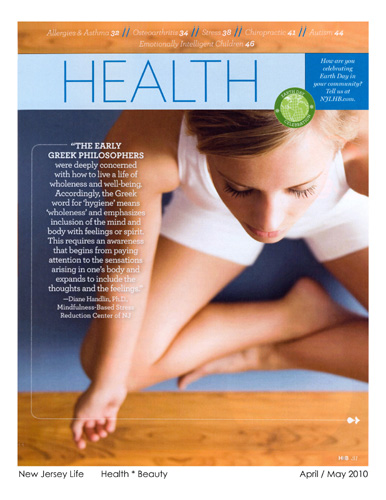Dear Reader,
After the
storms of winter, we are receiving the gift of spring. I can't ever
remember appreciating the gift of sunlight more. Just trying to be
present to life non-judgmentally moment by moment is enriching
emotionally, cognitively, somatically and relationally. And so, with
renewed energy, I am sending you this note because I am planning to
teach my next Mindfulness-Based Stress Reduction class in the late
spring / early summer in the Metuchen / Edison area. Specifics about the
class can be found on the MBSR Courses page at (www.mindfulnessnj.com)
as well as on the side of this e-letter.
Lately, there
has been an outpouring of new scientific research on the efficacy of
MBSR, including the use of MBSR to help prevent burnout among physicians
(Krasner et al. 2009) as well as research reported by
Ludwig and Kabat-Zinn 2008; Didonna 2008; and Lutz, Dunne and Davidson
2007 indicating MBSR's effectiveness in clinical environments and the
laboratory, furthering the work of the last 30 years and supporting
practices that are millennia old. As Jon Kabat-Zinn expressed it in
Stahl and Goldstein's recent, A Mindfulness-Based Stress Reduction
Workbook, the mind, trained through meditative disciplines can actually
change the brain (Siegel, 2007, Begley 2008):
This discovery
of an inherent plasticity in brain architecture and function, known as
neuroplasticity, implies that what we call the mind actually shapes the
brain, and drives transformation of our intrinsic capacities, and it
does so not just in childhood but across our entire lifespan. (...
the physical, material brain in our cranium, of course, allows for the
phenomenon we call "mind," including the ability of the mind to
experience and know itself.) p. xi
One recent example pointing toward the
usefulness of mindfulness practice for clinical work as well as well-balanced
living is a short article entitled, "The Hidden Treasure of Anger,"
written by Polly Young Eisendrath, Ph.D., a Jungian analyst, for the
March 2010 issue of Shambhala Sun magazine, p. 23. In it, she points
out that the emotion of human anger, called "the moral emotion" by the
Greeks, potentially differs from the phenomenon of strict animal
reactivity (often defined as a "fight or flight" syndrome) because it
contains the potential for reflection and the deepening of
understanding.
It is my understanding that this "moral
emotion" (as differentiated from self-righteousness as well as "fight or flight") which sometimes
arises within us as we turn toward our anger rather than being
completely driven by it, can help us to make fine discriminations
about the way the world is and the way we are. William Faulkner, in one
of his letters, argues that there are only two plots in all of
literature. One is the story of the world and the other is the story of
the self. The "moral emotion" of anger, by helping us cut through or
discriminate, has the potential to bring profound change both to the
world and to the self. Anger can do this because it has the potential,
when respected, not simply to be blinding, but to get our attention,
helping us to pause, or "even stopping us in our tracks," and to help us
make more conscious choices in our lives as we read ourselves and the
world with greater depth and clarity.
May this season of new
beginning help us all make choices that will lead to greater well-being
in our lives.
Diane Handlin, Ph.D.
Founder and Executive Director
Mindfulness-Based Stress Reduction Center of NJ
www.mindfulnessnj.com
soft spring wind,
even the maple in my bureau stirs.
- Jim Handlin
|
|
SELECTED RECENT RESEARCH
Begley, S., 2008. Train Your Mind, Change Your Brain: How a New Science Reveals our Extraordinary Potential to Transform Ourselves. New York: Ballantine Books. Didonna, F., 2008. Clinical Handbook of Mindfulness. New York: Springer. Krasner,
M. S., R. M. Epstein, H. Beckman, A. L. Suchman, B. Chapman, C. J.
Mooney, and T. E. Quill., 2009. Association of an educational program in
mindful communication with burnout, empathy, and attitudes among
primary care physicians. Journal of the American Medical Association 302 (12): 1338-40. Ludwig, D. S. and J. Kabat-Zinn, 2008. Mindfulness in medicine. Journal of the American Medical Association 300 (11): 1350-2. Lutz,
A., J. D. Dunne, R. J. Davidson, 2007. Meditation and the
neuroscience of consciousness: An introduction. In The Cambridge Handbook of Consciousness, edited by P. D. Zelazo, M. Moscovitch, and E. Thompson, Cambridge, UK: Cambridge University Press. Siegel, D. J., 2007. The Mindful Brain: Reflections and Attunement in the Cultivation of Well-Being. New York: Norton.
RECOMMENDED READING
- Full Catastrophe Living: Using the Wisdom of Your Body and Mind to
Face Stress Pain, and Illness by
Jon Kabat-Zinn.
- Wherever You Go, There You Are: Mindful Meditation in Everyday
Life by Jon Kabat-Zinn.
- Coming to Our Senses: Healing Ourselves and the World Through
Mindfulness by Jon Kabat-Zinn
- Heal Thy Self: Lessons on Mindfulness in Medicine by Saki Santorelli.
- Everyday Blessings: The Inner Work of Mindful Parenting by Myla Kabat-Zinn and Jon Kabat-Zinn
- The Mindful Way Through Depression: Freeing Yourself
From Chronic Unhappiness by Mark Williams,
John Teasdale, Zindel Segal, and Jon Kabat-Zinn.
|
|
|
Spring / Summer 2010
course
|
Location
Metuchen
/ Edison NJ area
For more information about our courses,
click here
|
from New Jersey Life
|

"The Early Greek Philosophers
were
deeply concerned with how to live a life of wholeness and well-being.
Accordingly, the Greek word for "hygiene" means "wholeness" and
emphasizes inclusion of the mind and body with feelings or spirit.
This requires an awareness that begins from paying attention to the
sensations arising in one's body and expands to include the thoughts and
the feelings."
- Diane Handlin, Ph.D.
from New Jersey Life Health and Beauty, May 2010
|
|